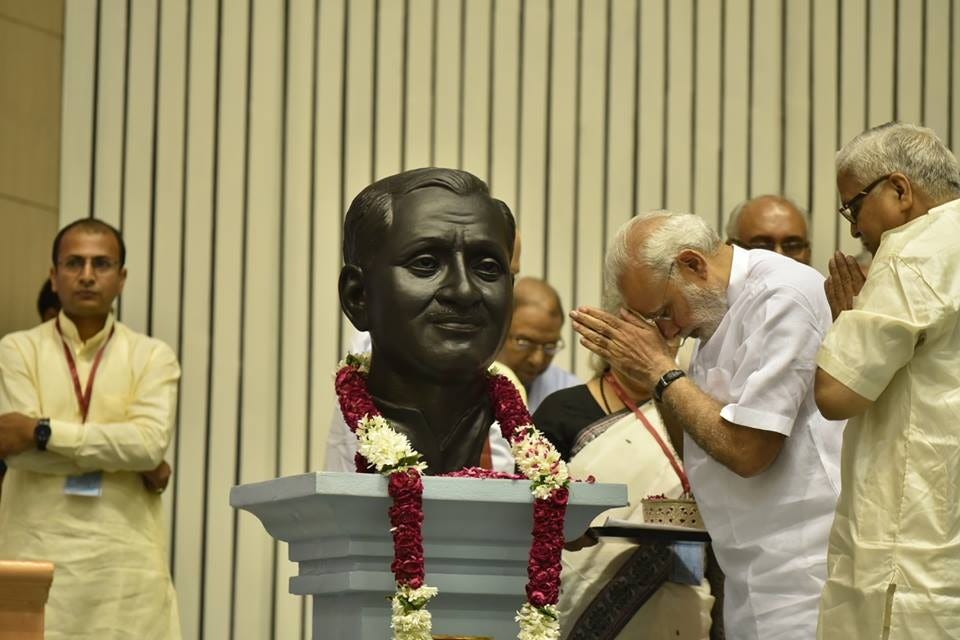Remembering Pandit Deendayal Upadhyay on his Birth Anniversary
Commemorating the Legacy of Pandit Deendayal Upadhyay on His Birth Anniversary
A Thinker, A Leader, A Visionary
Today marks the birth anniversary of one of India's most eminent political leaders and thinkers—Pandit Deendayal Upadhyay. Born on 25th September 1916, in Mathura, Uttar Pradesh, Upadhyay distinguished himself as a philosopher, economist, sociologist, historian, journalist, and above all, a true patriot. He received his early education in Sikar and Pilani, both in Rajasthan, under the guidance of his maternal uncle. For his higher education, Upadhyay attended colleges in Kanpur and Agra, laying the academic groundwork for his diverse intellectual pursuits. This commemorative article aims to celebrate the life, work, and enduring legacy of a man who profoundly shaped the ideological landscape of modern Indian politics.
Integral Humanism—The Core of His Philosophy
At the core of Pandit Deendayal Upadhyay's ideology was the profound and innovative concept of "Integral Humanism," a doctrine he envisaged as a harmonious union of material well-being and spiritual enlightenment. This ideological framework transcended the boundaries of conventional economic theories; it not only rejected both capitalism and communism but also offered a third path that was deeply rooted in India's unique socio-cultural milieu. Upadhyay aimed for an economic and governance model that was indigenously Indian at its core, yet capable of making a global impact.
Significantly, two tenets of Upadhyay's "Integral Humanism" bear a striking resemblance to principles cherished by Mahatma Gandhi—those of 'Sarvodaya' and 'Swadeshi.' Like Gandhi, Upadhyay believed in the 'Sarvodaya' principle, which advocates for the welfare and progress of all layers of society, ensuring no one is left behind. Similarly, both leaders were staunch proponents of 'Swadeshi,' the principle of self-sufficiency and the use of indigenous resources, as a way to empower local communities and make the nation self-reliant.
Deeply committed to his ideological convictions, Upadhyay firmly believed that the vision of a prosperous, equitable, and self-reliant India could only be realised by synthesising traditional Indian wisdom with the demands of modern pragmatism. This holistic viewpoint was rooted not only in India's philosophical richness but also in the practical necessities of governance and socio-economic development in the modern age. His ultimate goal was not merely to inform policy but to cultivate a new national consciousness—a consciousness that exuded pride in its native values while adeptly handling the intricacies of a rapidly evolving world.
His Connection with the Bharatiya Jana Sangh and Relationship with Shyama Prasad Mukherjee
Pandit Deendayal Upadhyay's association with the Rashtriya Swayamsevak Sangh (RSS) was more than just a political alliance; it was a synergistic partnership rooted in shared ideological convictions. This deep connection paved the way for him to become an instrumental co-founder of the Bharatiya Jana Sangh (BJS), alongside another stalwart of Indian politics, Dr. Shyama Prasad Mukherjee. The BJS emerged as a political force that was ideologically harmonious with Upadhyay's philosophy of "Integral Humanism," with its agenda centred on safeguarding India's rich cultural heritage and fortifying a strong, unified nation.
The premature demise of Dr. Mukherjee in 1953 left a vacuum in the party's leadership, but Upadhyay rose to the occasion, shouldering the responsibility to carry forward the BJS's mission. He went beyond merely sustaining the party; he fortified its ideological framework, expanded its political outreach, and bolstered its presence in the Indian political landscape. His tenure at the helm saw the BJS evolve from a fledgeling party into a force to be reckoned with, articulating a distinct political vision that was neither blindly Western nor rigidly traditional but uniquely Indian.
Through these efforts, Upadhyay not only sustained the legacy of Dr. Mukherjee but also enriched it, infusing the BJS with the intellectual rigour and ideological clarity that would eventually shape the trajectory of right-wing politics in India. His work laid the groundwork for the party to evolve into what would later become the Bharatiya Janata Party (BJP), thus leaving an indelible imprint on India's political tapestry.
The Mysterious End
Pandit Deendayal Upadhyay's life met an abrupt and tragic end on the night of 11 February 1968, under circumstances that are still shrouded in mystery. His lifeless body was discovered near the tracks at Mughalsarai Railway Station, sparking a slew of investigations and giving rise to numerous theories about the cause of his death. From suspicions of political foul play to various conspiracy theories, the truth behind his untimely demise has eluded investigators and historians alike, and remains a subject of endless speculation even today. This sudden and enigmatic end left an indelible void not just within the Bharatiya Jana Sangh, the party he had nurtured, but also in the broader realms of Indian politics and intellectualism. The unanswered questions surrounding his death have only intensified the mystique that envelops his legacy, making the loss of such an eminent thinker and patriot all the more poignant.
The Undying Legacy—More Than Just Eponymous Tributes
While numerous institutions and government schemes bear his name, Pandit Deendayal Upadhyay's legacy is far richer and more nuanced than that. His pride in traditional Indian values, culture, architecture, philosophy, science, and literature is a clarion call to the youth of today. At a time when the Western narrative often dismisses India as impoverished or backward, Upadhyay's philosophy serves as a guiding light. He did not repudiate modern science and technology; rather, he ingeniously integrated them with Indian traditions.
As India marches ahead under the dynamic leadership of Prime Minister Narendra Modi, Upadhyay's vision of "Integral Humanism" resonates stronger than ever. It stands as a beacon, not just for young Indians irrespective of their religious faith but for the entire nation.
A Clarion Call
In conclusion, Pandit Deendayal Upadhyay's life and philosophy represent not just a political ideology, but a rich tapestry that embodies the essence of an India steeped in timeless culture, galvanized by indigenous innovation, and unified under the banner of a shared destiny. His vision of "Integral Humanism" serves as a beacon of light, guiding us through the complexities of modern life while retaining the soul of traditional Indian wisdom. As we celebrate his birth anniversary today, let it not just be a moment of remembrance, but a compelling clarion call for every Indian, young and old, to delve deeply into the life and works of this extraordinary patriot and thinker.
Though his life was tragically cut short under mysterious circumstances, the enduring legacy of his ideas and philosophies continues to shape the very ethos and soul of this great nation. Under the dedicated and dynamic leadership of Prime Minister Narendra Modi, India marches ahead in the global arena, a journey that finds resonance in the teachings of Upadhyay. The moment is ripe for us to read, learn, and find inspiration in the life and philosophy of Pandit Deendayal Upadhyay—a true 'desh bhakt' whose teachings illuminate our path, enrich our heritage, and provide a sturdy intellectual foundation for the generations to come.





